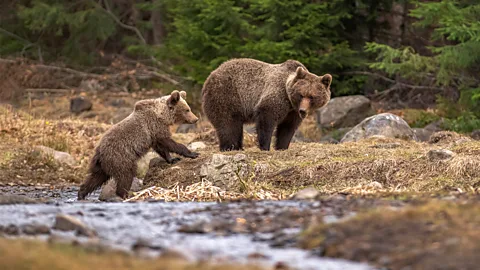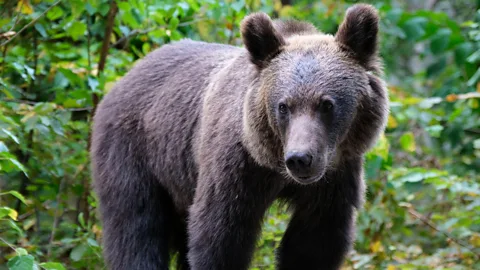The European nation where bears roam free
 Alamy
AlamyAs Romania's bear population grows, so do the opportunities for travellers to come face to face with the predators in a responsible way.
Romania is home to the largest population of wild brown bears in Europe outside of Russia, with as many as 13,000 bears living in and around the largely untouched forests of the Carpathian Mountains. But while bear-spotting has long been a tourist attraction in Romania, it historically didn't involve venturing into the forest.
"It wasn't that long ago that it was commonplace to see a bear kept in a cage outside of businesses here to attract customers," host Reece Parkinson explained in a recent episode of BBC's The Travel Show.
When Romania joined the European Union in 2007, the country began to adhere to the EU Zoos Directive, which issues guidelines for how captive animals are to be treated. In the past 18 years, the country has turned to more humane and sustainable ways to show off one of Europe's last truly wild corners and the brown bears who thrive here.
Brown bears have roamed the woods and mountains of Europe for millions of years. However, their numbers dwindled significantly as human civilisation expanded. Today, it's estimated that roughly 36,000 bears live in the European part of Russia, but new research conducted by Romania's Forestry Research Institute reveals that the nation's brown bear population is much higher than previously estimated – a fact that has brought both opportunity and challenges to surrounding communities.
On one hand, sustainable bear tourism in Romania is growing. Numerous tour operators like Outdoor Holidays and Much Better Adventures now offer visitors guided "bear-sighting" hiking trips into the forests where brown bears live. This, in turn, also brings economic opportunities to the country's more rural communities and encourages continued conservation of the animals' habitat.
There's even a dedicated safe haven: Libearty Bear Sanctuary, nestled in the southern Carpathian Mountains in the town of Zarnesti, is the world's largest brown bear sanctuary. It not only rescues and provides medical care to formerly captive bears who can't be released into the wild, but also offers public tours, allowing visitors them to see the bears in a 69-hectare expanse of oak forests and grasslands.
"In the last 20 years, Cristina Lapis and her team [at Libearty Bear Sanctuary] have given a home to over 130 bears here in Transylvania," said Parkinson.
Unfortunately, not everyone is enthusiastic about their furry neighbours. As the bear population flourishes, so do dangerous encounters with humans.
Some local farmers, many of whom have lost livestock to the bears, have lobbied for culling Romania's brown bear population. Visitors have also had conflicts with the animals, often because of unexpected encounters while hiking the mountains – several of which have turned deadly. Still Lapis, who runs the sanctuary, insists that such encounters are not the norm.
 Alamy
Alamy"I know hundreds of thousands of cases where people who are used to the forest saw a bear and nothing happened. So [there] must be something special that an accident happened," said Lapis. "When you go in the forest… it's important to make noise. If you make noise the animal knows you're coming and goes away."
Efforts are underway to try to find a happy medium that protects the bears and keeps visitors and livestock as safe as possible. The animals are protected under Romanian law, and reforestation and educational efforts are underway to prevent the bears from entering into human territory to feed and to teach humans what to do when they encounter a bear in the woods.
Most life-threatening encounters with bears are due to human error, usually when a human startles a bear or interacts inappropriately with cubs, making mother bears defensive. Therefore, when hiking in bear country – whether in Romania or elsewhere – it's important to talk loudly or clap your hands to give the animals time to avoid you. If you come upon a bear accidentally, make yourself as large as possible and back away.
"We cannot live alone [in the wilderness]," Lapis said. "We have to learn to share."
--
If you liked this story, sign up for The Essential List newsletter – a handpicked selection of features, videos and can't-miss news, delivered to your inbox twice a week.
